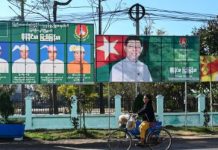The formation of a free society and state is impossible without the formation of stable electoral legal culture. It is a generally accepted fact that elections are the basis of people’s power. It is generally accepted that the existence of free elections in the country is one of the principles of a democratic regime of government and a republican form of government. In accordance with clause 1 of Article 9 of the Convention on Standards of Democratic Elections, Electoral Rights and Freedoms in the CIS Member States: “Genuine elections ensure the identification of the freely expressed will of the people and its direct implementation».
Over the past few years, significant changes have taken place in the political system of the Republic of Uzbekistan, which have affected all spheres of socio-political life. One of these changes is the innovation of the electoral legislation. This means changing the electoral system of the Republic of Uzbekistan from majority to majority-proportional one (sometimes it is called mixed) in elections to the Legislative Chamber of the Oliy Majlis of the Republic of Uzbekistan. The mixed electoral system, in which two classical electoral formulas (majority and proportional) are linked, is also used in a number of other states on different continents, from the states of the European Union (Bulgaria, Hungary, Germany, Italy, etc.) to the states of the Far East (Japan, etc.)
What is the purpose of the transition to majority-proportional electoral system?
Firstly, this system facilitates more complete accounting of votes and reflects the real political situation in the country more accurately.
Secondly, the representation of the regions of Uzbekistan in the lower house of parliament will become more balanced.
Thirdly, a change in the format of relations between parties and candidates, since parties will have to focus on the search for candidates who are really famous, authoritative and able to work actively with voters.
Fourthly, a platform is created for the emergence of new public politicians.
Mixed electoral systems are divided into three types:
1) with the dominance of proportional representation (proportional-majority);
2) with the dominance of the majority system (majority-proportional);
3) balanced systems, in which proportional and majority systems are used on an equal footing.
In the Republic of Uzbekistan, the legislation enshrines the transition to the balanced system. Thus, Part 2 of Article 67 of the Electoral Code of the Republic of Uzbekistan establishes that seventy-five deputies of the Legislative Chamber are elected in single-mandate electoral district, seventy-five -on the basis of the party list in proportion to the number of votes cast for political parties in a single electoral district. Usually, under such systems, on election day, the voter is given a separate ballot in which he votes specifically for the candidate, and a separate ballot in which he votes for the party. Although each state has its own practice. For example, in Germany, the precinct election commission issues one ballot, in which candidates of a single-mandate electoral district are placed on the one hand, and land lists areplaced on the other hand, in Russia voters are given two ballots at polling stations.
Part 3 of Article 31 of the Electoral Code of the Republic of Uzbekistan stipulates that “the ballot paper shall contain the surname, first name, patronymic of the candidate in alphabetical order, indicating the year of birth and the political party that nominated him/her as a candidate”, which characterizes the elections to the Legislative Chamber in single-mandate electoral districts.
Part 4 of Article 31 of the Electoral Code establishes that “the ballot paper for the election of deputies of the Legislative Chamber in a single electoral district shall include the name and symbols of the political parties participating in them sequentially in accordance with the procedure in which they were allowed to participate in the elections.” This means that two types of ballots will be produced in the elections to the Legislative Chamber. This norm is a serious test for political parties and implies painstaking work on the development of their political program in order to eliminate deliquescence and determine the clarity of party lines.
It should be noted that Art.401 of the Electoral Code of the Republic of Uzbekistan enshrined the norm on the registration and publication of the party list by the Central Election Commission, as well as single-mandate candidates.The idea of registering and publishing lists of candidates running in a single electoral district is correct. The voter will form his own idea of the party, based on the candidates nominated by the parties in their party lists. At the same time, it is necessary to resolve the most important issue – the methodology for distributing mandates within the list.
The changes concerning the issue of detecting the election results are not less interesting. Candidates for deputy from a single-mandate electoral district are determined by the winner-take-all system. Thus, according to Part 5 of Article 96 of the Electoral Code of the Republic of Uzbekistan, the candidate who has received the largest number of votes becomes the winner. This system is very effective, except for cases when two or more candidates have received the same number of votes. The winner-take-all system is used as the only one for elections of any chamber of parliament (or both chambers) in 43 countries, including the United States and a number of states – members of the British Commonwealth of Nations.
With regard to political parties elected in a single electoral district, Art.961of the Electoral Code of the Republic of Uzbekistan established a seven percent threshold. Thus, a political party receives a parliamentary mandate only if it received seven percent of the votes of voters who took part in the voting in a single electoral district.
Why did the legislator establish this threshold? What is the reason for its existence? In the legal literature containing various opinions on this issue, the following grounds for its introduction are noted:
1)The threshold is introduced to reduce the participation in the distribution of seats in parliament of parties that received support from voters at the level of “noise”, error or accident that occurred at polling stations, which made up about 2 percent of the total number of citizens’ votes. This value is considered acceptable due to the instability of the group of voters, the high share of accident and a number of other factors that affect the elections
2) The threshold is used to avoid excessive factional fragmentation within parliament, which could lead to its decentralization and paralysis of its work.
3) The threshold is introduced to exclude negative activity and the influence of small parties on the adoption of important decisions, including in the formation of the government. This effect lies in the fact that small parties form factions that have significant weight in making the final decision, which actually puts them in a dominant position over large parties. Ultimately, this resulted in the political crisis in Israel in 2019–2022, when five snap elections to the Knesset were held for 3.5 years.
4) The threshold is also introduced in order to provide parties participating in the distribution of mandates with the opportunity to have efficient fractions for the most fruitful implementation of their functions.
What is this threshold in foreign countries? In the Netherlands, it is 0.67%, Russia – 5%, Kazakhstan – 7%, Egypt and Liechtenstein – 8%, Turkey – 10%. Along with this, there is a number of countries where there is no threshold at all: we see this in Portugal, the United States, Great Britain, Canada, France, Sweden and some other countries.
Conclusion
Through its own mechanics, socio-political life has influenced the structure of inter-party competition, and inter-party competition, in turn, is a factor in reforming the intra-party system. All this together is a determinant of changes in the electoral system. We have something to strive for. We are confident that the upcoming elections to the representative bodies of state power of the Republic of Uzbekistan will set us the task of developing and supplementing the sphere of electoral law with new ideas prompted by practice and experts.
Gulchekhra Malikova,
Chief Researcher,
Institute of Legislation and Legal Policy
under the President of the Republic of Uzbekistan,
Doctor of Law, Professor












